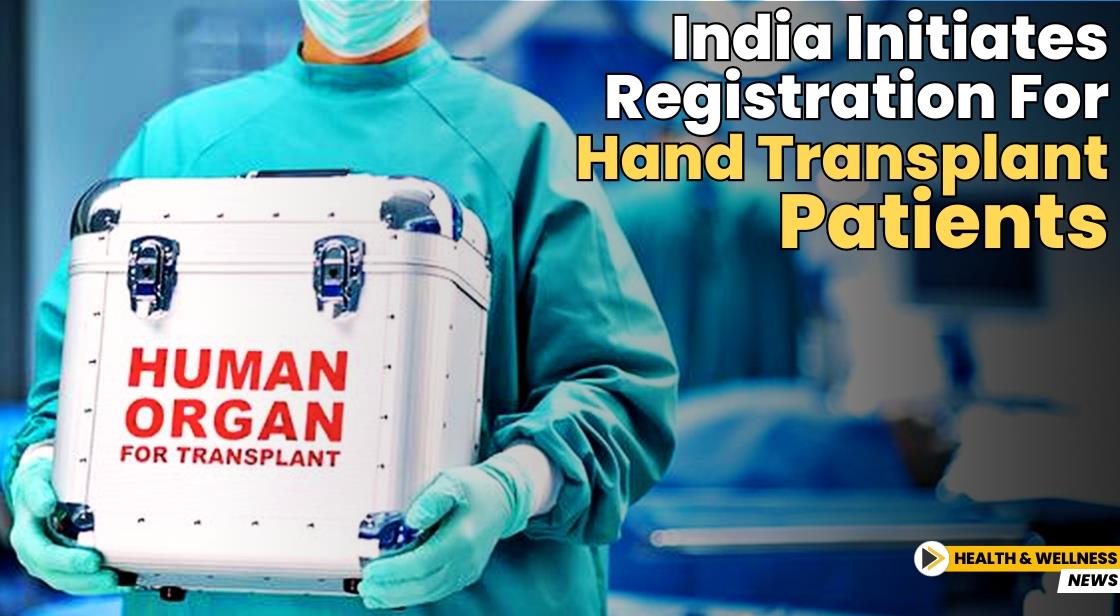India Initiates Registration for Hand Transplant Patients

News Synopsis
For the first time, India has launched a national registry specifically for patients requiring hand transplantation. This landmark initiative, facilitated by the National Organ and Tissue Transplant Organisation (NOTTO), under the Union Health Ministry, is set to ensure transparent and priority-based allocation of donated hands. This registry marks a significant step forward in organ donation, aiming to streamline the process for those in need of hand transplants while promoting greater awareness and participation in hand donations.
National Registry Managed by NOTTO
The registration for patients requiring hand transplants will be maintained within the national registry under the purview of NOTTO. According to a letter from NOTTO Director Anil Kumar, this registration is currently managed under the "bone" category in the tissue section on the NOTTO web portal, ensuring that all hand transplant centers across India comply with this new system. The aim is to simplify the national allocation process and manage data effectively for both donors and recipients of hand transplants.
Boosting Hand Donation and Transplantation
Dr. Subramania Iyer, a renowned surgeon from Amrita Hospitals and School of Medicine, Kochi, and the leader of India’s first hand transplant team in 2015, emphasized the importance of the new registry. According to him, this initiative will significantly enhance both the donation and allocation of hands. Establishing a registry will help prioritize patients across the country and ensure that the donated hands are utilized effectively and transparently.
Increasing Number of Hand Transplants in India
Since 2015, hand transplants in India have gained momentum, with more centers across the country offering this service. As of now, nine hospitals in India are registered to perform hand transplants, with a total of 36 patients having received transplants. Data compiled by NOTTO shows that 67 hands have been transplanted so far. The demand for hand transplants is on the rise, and with this new registry, the process is expected to become smoother and more accessible to patients nationwide.
Hand Donation: Brain Death vs. Cardiac Death
While most organs are typically donated after brain death, hands can be donated following both brain death and cardiac death. Dr. Iyer explained that in the case of cardiac death, hands must be donated within 30 minutes of the heart stopping. This process can only take place in a controlled hospital environment, making it more challenging than other forms of organ donation. However, the new registry and increased awareness are expected to address these challenges and promote hand donation as a viable option.
Composite Tissue Transplants: A Growing Field
Hands are classified under the category of "composite tissue," and awareness surrounding this form of transplantation has been steadily growing. With more patients seeking hand transplants and more donations taking place, the registration process for hand transplants is now formalized to better serve those in need. Dr. Iyer highlighted that this will help NOTTO ensure efficient national allocation and data management for donors and recipients alike.
Challenges in Hand Transplantation
Despite the growing number of hand transplants in India, challenges remain. According to Dr. Iyer, the main factor limiting the widespread use of hand transplants is the limited availability of donated hands. Unlike other organs, hand donation is not always perceived favorably, making it difficult to secure the necessary donors. In addition, logistical challenges, such as the timely transfer of donated hands across the country, add further complications to the process.
The Importance of a National Registry
The establishment of the national registry is expected to address some of these challenges by streamlining the allocation process and making hand donation more transparent. By ensuring that hand transplants are allocated on a priority basis, the registry will encourage more donations and ensure that hands are used efficiently. The registry will also allow for better management of the data associated with donors and recipients, contributing to the overall success of hand transplantation in India.
A Breakthrough in Hand Transplantation
India's journey in hand transplantation began in 2015 when a 29-year-old man underwent the country’s first bilateral hand transplant. Since then, hand transplants have become a valuable procedure for patients who have lost one or both hands. Successful transplants have been carried out at various levels of amputation, including forearm, upper arm, and even shoulder-level amputations. This progress highlights the significant role that hand transplants play in restoring the quality of life for patients who have suffered severe limb loss.
The Path Forward: Encouraging Hand Donation
While the technical and organizational aspects of hand transplantation have improved, the process remains underutilized due to the lack of available donors. Dr. Iyer emphasized that hand donation is often not considered as readily as other forms of organ donation. However, the new registry, along with increased awareness, is expected to change this. By prioritizing the allocation of hands across the country and promoting the benefits of hand donation, the government aims to encourage more people to consider this life-changing act of giving.
Conclusion: A New Era for Hand Transplants in India
India’s new hand transplantation registry represents a significant step forward in the field of organ and tissue donation. By creating a transparent and priority-based system for the allocation of hands, the government is ensuring that more patients can benefit from this transformative procedure. With continued efforts to raise awareness and promote hand donation, India is poised to make even greater strides in hand transplantation, offering hope to countless individuals in need of this life-changing surgery.
You May Like









